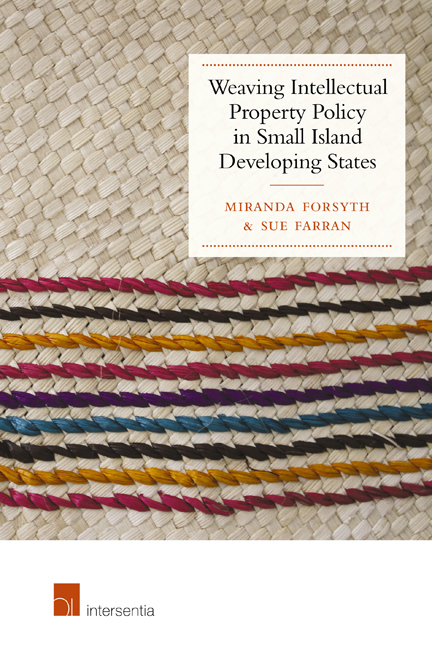Book contents
- Frontmatter
- Dedication
- Acknowledgements
- Contents
- List of Tables
- Introduction
- Chapter 1 Intellectual Property and Development: The Issues Viewed through a Pacific Islands Prism
- Chapter 2 Health and Issues of Access to Medicine
- Chapter 3 Access to Educational Resources
- Chapter 4 Problems with Importing the Global Intellectual Property Regime into Pacific Island Countries: Learning from Land
- Chapter 5 Setting Out a New Approach to Intellectual Property and Development
- Chapter 6 Intellectual Property and Technological Innovation in Pacific Island Countries: The Example of Sustainable Sea Transport
- Chapter 7 Branding, Certifying and Authenticating in Pacific Island Countries
- Chapter 8 The Regulation of Traditional Medicinal Knowledge in Pacific Island Countries
- Conclusion
- About the Authors
Conclusion
Published online by Cambridge University Press: 22 November 2017
- Frontmatter
- Dedication
- Acknowledgements
- Contents
- List of Tables
- Introduction
- Chapter 1 Intellectual Property and Development: The Issues Viewed through a Pacific Islands Prism
- Chapter 2 Health and Issues of Access to Medicine
- Chapter 3 Access to Educational Resources
- Chapter 4 Problems with Importing the Global Intellectual Property Regime into Pacific Island Countries: Learning from Land
- Chapter 5 Setting Out a New Approach to Intellectual Property and Development
- Chapter 6 Intellectual Property and Technological Innovation in Pacific Island Countries: The Example of Sustainable Sea Transport
- Chapter 7 Branding, Certifying and Authenticating in Pacific Island Countries
- Chapter 8 The Regulation of Traditional Medicinal Knowledge in Pacific Island Countries
- Conclusion
- About the Authors
Summary
At the outset of this book we situated intellectual property in a global multi¬dimensional context. We pointed out the instrumentality of intellectual property in creating and reflecting social, political and economic relations within and between nation states, and the way it is implicated in, and impacts upon, a wide range of developmental questions in the global South. We drew attention to two apparently separate approaches relevant to the governance of knowledge and other intangible resources. First, the dominant paradigm coming from the global North, in which strong intellectual property regulation is manifested through legislation and institutions, founded on neoliberal values and characterised by a ‘top-down’ approach and a one-way transfer of technical assistance from the global North to the global South. Second, we saw a more nuanced, plural, often unwritten regulation of ‘intellectual property’ operating at a number of inter-related levels including from the ‘bottom up’ found in indigenous societies throughout the Pacific islands and elsewhere in the world. This latter approach has been all but ignored in the relentless expansion of the neoliberal model of intellectual property regulation through Free Trade Agreements, and the ideational promotion of proprietary approaches to intellectual property leading to ‘development’. We have also seen how critics of this phenomenon have tended to focus on the flexibilities and exceptions within that model, rather than stepping outside it all together. While we are not suggesting that these flexibilities and exceptions are not relevant - many are highly useful to Pacific island states, as we have indicated throughout the book - our aim has been not only to critique the dominant paradigm, but to demonstrate, by drawing on real practices of Pacific islanders, that there are other ways of doing things, the value and validity of which should be acknowledged and built upon.
The justification for adopting a different or alternative paradigm for intellectual property regulation requires challenging the arguments surrounding the instrumentality of the current dominant paradigm of intellectual property in development, and the ideational narratives which bolster it.
- Type
- Chapter
- Information
- Publisher: IntersentiaPrint publication year: 2015

